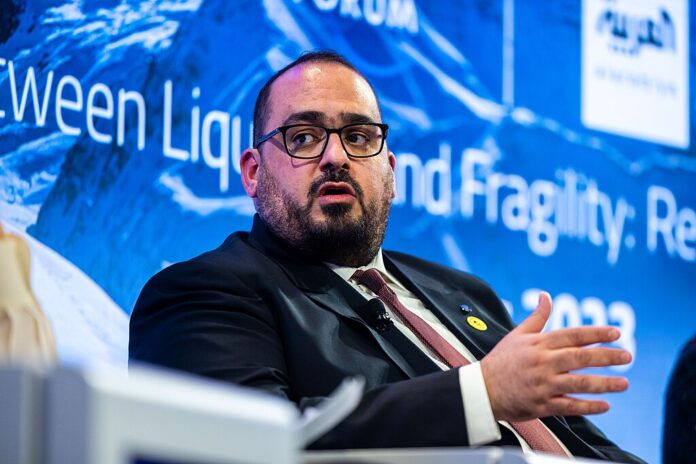Minister Faisal Al-Ibrahim discusses the impact of the energy transition, AI, and global tensions on the Saudi investment landscape at FII8, highlighting growth under Vision 2030
According to Faisal Al-Ibrahim, Saudi Arabia’s Minister of Economy and Planning, the Saudi investment landscape is undergoing rapid transformation driven by global shifts in energy, technological advancements, and geopolitics. Speaking at the Future Investment Initiative (FII8) conference on October 31, Al-Ibrahim emphasized the importance of “efficiency-seeking investments” to boost productivity and support long-term growth in the face of increasing global challenges.
Al-Ibrahim remarked that megatrends in energy transition, artificial intelligence, and geopolitical fragmentation are reshaping investment dynamics worldwide, calling on the global community to harness opportunities created by these shifts. “We can and must fulfil our shared responsibility to invest in the future and capture opportunities that come with these paradigm shifts,” Al-Ibrahim emphasised, noting the importance of a targeted investment approach to tackle current economic vulnerabilities, including low growth and high debt.
With Saudi Arabia’s Vision 2030 as a backdrop, Al-Ibrahim outlined the Kingdom’s notable progress in diversifying its economy away from oil dependency. “Our economy without oil has grown by 20 per cent since the launch of Vision 2030, and non-oil activities now represent 53 per cent of our real GDP,” he said, crediting regulatory reforms and strategic investments in non-oil sectors for this milestone. He further highlighted that private investments in Saudi Arabia’s non-oil sectors have surged by 70 per cent, contributing significantly to the Kingdom’s economic development.
Embed from Getty ImagesAl-Ibrahim also emphasized the necessity for collaboration between the public and private sectors to address the evolving demands of the Saudi investment landscape. “The public and private sectors must evolve together to align with today’s needs. Investment alone does not drive growth; it serves as a starting point and a catalyst for progress. What truly matters is how and where these investments are directed,” he stated, advocating for more efficient capital allocation to maximize returns during his remarks at FII8.
Echoing this, Saudi Minister of Investment Khalid Al-Falih revealed that the Kingdom has already surpassed its Vision 2030 target of attracting 500 international company headquarters, with 540 companies, including major firms like Northern Trust, Bechtel, and PepsiCo, now establishing bases in Riyadh. This move, driven by the Kingdom’s regional HQ programme, provides 30-year tax exemptions and other incentives, making Saudi Arabia an increasingly attractive hub for multinational firms seeking a presence in the Middle East.
In addition to multinational headquarters, Saudi Arabia’s expanding capital markets are proving appealing to international investors, a trend highlighted by Mohammed El-Kuwaiz, chairman of Saudi Arabia’s Capital Market Authority (CMA). El-Kuwaiz noted that foreign investment in the Saudi capital market has soared to over SR400 billion (USD 106.5 billion), a significant increase from virtually zero five to six years ago. This expansion forms part of the Kingdom’s broader strategy to attract $3 trillion in investments to meet Vision 2030’s ambitious goals, tapping into both public and private funding sources.
Al-Ibrahim further noted that Saudi Arabia’s regulatory environment now provides a transparent, innovative framework that gives investors confidence in the Kingdom’s business landscape. “Saudi Arabia is not just the largest economy in the Middle East; it is a trusted and reliable partner in the global economy, offering an environment that combines regulatory clarity with practical solutions,” he said, referencing the Kingdom’s appeal to companies looking for stability in a volatile global landscape.
Al-Ibrahim also underscored the role of technology and innovation in shaping Saudi Arabia’s future. With investments in artificial intelligence, green energy, and high-tech industries, the Kingdom has positioned itself as an investment powerhouse in the Middle East and North Africa region, paving the way for more sustainable, diversified growth.
During FII8, the public and private sectors articulated a unified vision for the Kingdom’s growth, paving the way for significant collaboration as Saudi Arabia transitions to a post-oil economy. With a focus on the evolving Saudi investment landscape, the Kingdom is committed to sustained reforms, high-profile investments, and technological advancement. These efforts aim to solidify Saudi Arabia’s role as a key player on the world stage, with Vision 2030 guiding its journey toward a diversified, resilient economy.
